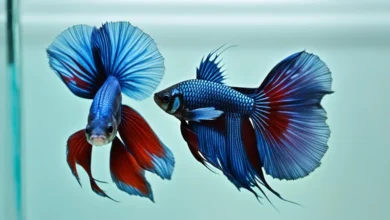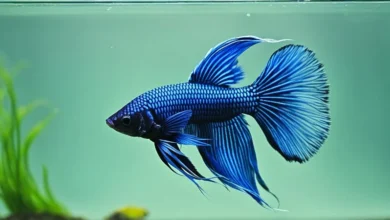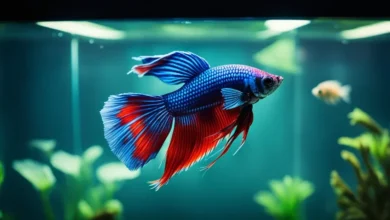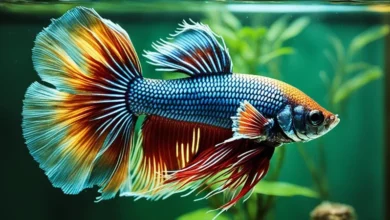
Have you ever wondered, “How long do betta fish live?” Considering these vibrant creatures are a favorite among aquarium enthusiasts, it’s crucial to understand the spectrum of their lifespans and what you can do to extend them. Betta fish, also recognized as Siamese fighting fish, typically enjoy a lifespan of 2-4 years. However, this duration can significantly vary based on their environment and the level of care they receive.
By educating yourself about betta fish lifespan and implementing dedicated care routines, you have the power to impact how long your betta thrives in captivity. This exploration of betta fish life expectancy isn’t just about numbers; it’s about enhancing the quality of life for these fascinating fish, thus naturally prolonging it.
Understanding Betta Fish Lifespan
When I first started keeping betta fish, the range of their expected lifespan surprised me. Typically, understanding betta fish lifespan involves recognizing that these vibrant creatures average between 2 to 4 years of life, though with exceptional care, some can surpass this, living up to 5 years or more.
The Average Lifespan of Betta Fish
Most betta fish enthusiasts aim to exceed the lower end of the typical betta fish lifespan. Achieving this isn’t just a matter of luck; it involves meticulous care and a deep understanding of their needs, which directly impacts their health and longevity.
Factors Influencing Betta Fish Life Expectancy
- Tank Conditions: The size and cleanliness of the aquarium play a crucial role. Betta fish thrive in tanks that offer plenty of space to swim and stable water conditions that mimic their natural habitats.
- Water Quality: Regularly maintaining water quality, including appropriate pH levels and temperatures, is essential for preventing stress and disease.
- Nutrition: Just like humans, bettas need a balanced diet. A mix of high-quality pellets and live food can cover all their dietary needs.
Myths vs. Reality: Betta Fish in Small Containers
One common myth I’ve encountered is that betta fish can live in small bowls or vases. However, through increasing awareness about betta fish myths and reality, more hobbyists understand that these conditions are far from ideal. Betta fish require adequate space not just for comfort but for their overall health, debunking the misconception that they can thrive in minimalistic environments.
This learning journey has expanded my understanding betta fish lifespan and illuminated the multiple factors influencing betta fish lifespan. It’s clear that to help these fish lead a full and vibrant life, they need much more than just a small amount of water.
Betta Fish Care for Longevity
Ensuring the long-term health and vitality of your betta fish involves a combination of proper tank space, excellent water quality, and optimal nutrition. These elements are crucial for not just surviving but allowing your betta fish to thrive. Let’s explore three critical aspects of betta fish care that contribute directly to their longevity.
The Importance of Tank Space and Quality
When it comes to tank space for betta fish, more is generally better. Small tanks can limit their ability to exercise and may quickly accumulate toxic substances without regular maintenance. Ideally, a single betta fish should have at least a five-gallon tank. This size not only ensures ample swimming space but also facilitates easier control of water quality. Good tank quality with proper filtration and a consistent maintenance schedule ensures harmful chemicals stay at minimal levels, creating a healthy environment for your betta.
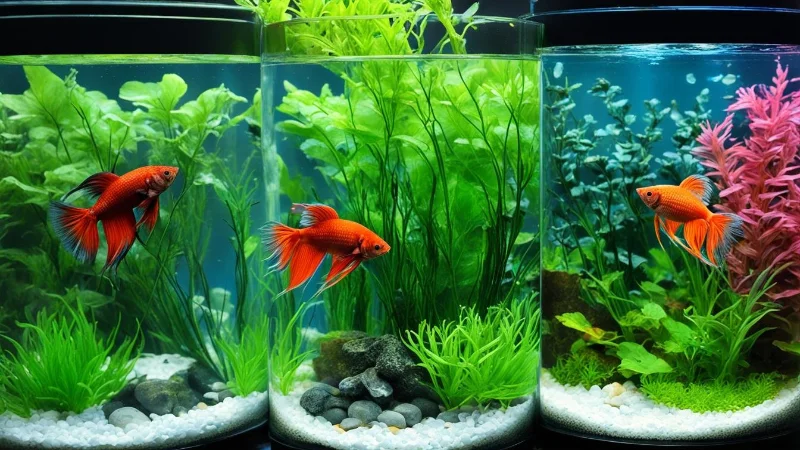
Clean Water: A Crucial Element in Betta Fish Health
Speaking of betta fish water quality, it’s paramount to change the water regularly and monitor its conditions. Ammonia and nitrate levels should be kept to an absolute minimum to avoid health issues. Utilizing a reliable water filtration system can help maintain these conditions, but nothing substitutes for regular, partial water changes. Experts recommend changing at least 20-25% of the water weekly to ensure optimal conditions for your betta’s health.
Feeding Betta Fish for Optimal Health
Lastly, betta fish nutrition plays a pivotal role in their health and longevity. A diet rich in high-quality pellets, designed specifically for betta fish, can provide most of their nutritional needs. However, supplementing this with occasional treats like bloodworms or brine shrimp can keep your betta vigorous and healthy. It’s crucial to feed appropriately, as overfeeding can lead to obesity and water quality issues which can drastically shorten your betta’s lifespan.
By focusing on these areas — tank space for betta fish, water quality, and nutrition — you are setting up your betta for a long, healthy life. Remember, consistency is key in betta fish care for longevity.
Betta Fish Lifespan in Captivity
When I first began keeping betta fish, I learned that their lifespan in captivity is often shorter than in the wild. This insight fueled my dedication to provide the best care possible, aiming to extend their betta fish lifespan through meticulous care and a conducive environment.
Understanding the typical betta fish lifespan in captivity helps enthusiasts like myself set realistic expectations and strive for optimal conditions in our aquarium setups. Here’s how I approach extending my bettas’ lives:
- Consistent Water Quality: Ensuring the water is consistently clean and filtered reduces stress and prevents disease, crucial for extending a betta’s life.
- Adequate Nutrition: Feeding them high-quality food that caters specifically to betta dietary needs supports their health and vitality.
- Appropriate Tank Environment: Avoiding overcrowding and providing a tank with plenty of space for swimming are essential to their wellbeing.
Each of these factors plays a pivotal role in not just sustaining life but enhancing the quality of life, thereby potentially increasing the betta fish lifespan even while in captivity. By sharing this knowledge and experience, my hope is that others will be encouraged to provide their betta fish with a level of care that optimizes their health and longevity.
Creating a Low-Stress Environment for Bettas
To ensure the health and longevity of your betta fish, creating a low-stress environment is crucial. Stressful conditions can adversely affect their wellness, which makes reducing betta fish stress a priority for any responsible owner. Addressing stressors effectively involves not only recognizing what causes stress but also taking preventive measures to minimize their impact.
Recognizing and Reducing Betta Fish Stressors
Recognizing the signs of stress in betta fish is the first step to creating a conducive living environment. Common stress indicators include frequent hiding, loss of color, and reduced appetite. To reduce these stressors, maintain stable water conditions, provide adequate shelter, and ensure a quiet, calm surroundings. Regular water checks and controlled feeding schedules are essential in reducing betta fish stress and fostering a tranquil habitat.
Choosing Compatible Tank Mates for Your Betta
- Harlequin Rasboras: Known for their peaceful nature and similar water condition requirements.
- Ghost Shrimp: These creatures add liveliness without triggering aggressive behavior due to their translucent bodies and quick movements.
- Corydoras Catfish: Their bottom-dwelling behavior makes them less invasive and compatible tank mates for betta fish.
Introducing the right tank mates is vital for keeping your betta’s stress levels low. Choose species that do not compete with betta fish for territory or food, as this can lead to increased stress and aggression.
The Consequences of Housing Male Bettas Together
Housing male bettas together can lead to significant stress due to their territorial nature, often resulting in aggressive encounters that can harm their health. To prevent such scenarios, it is advisable to keep male bettas in separate tanks or ensure that there is ample space and hiding spots if housed in larger community tanks. Proper planning and separation are crucial in creating a low-stress environment for betta fish and preventing the adverse effects of their territorial instincts.
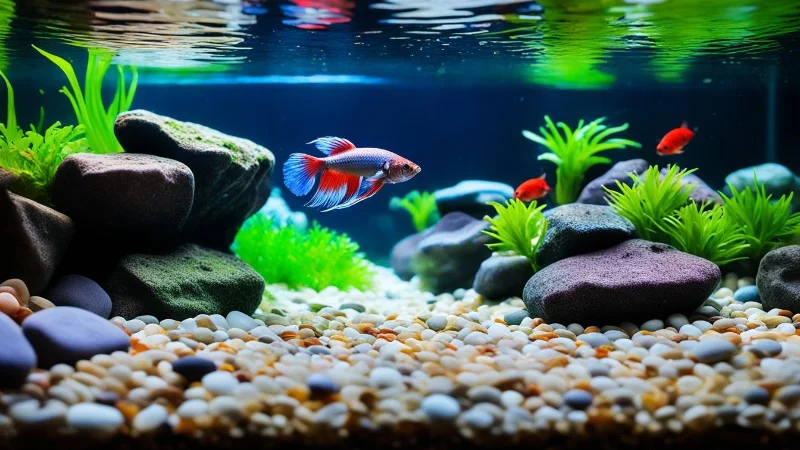
Identifying and Addressing Betta Fish Health Issues
As a betta fish enthusiast, recognizing betta fish health issues early can make a significant difference in their wellbeing. Knowledge of signs of illness in betta fish and preemptive steps in preventing betta fish diseases are crucial for maintaining your fish’s health.
Common Signs of Illness in Betta Fish
Understanding the signs of illness in your betta fish is critical. Some symptoms to look out for include lethargic behavior, fading colors, frayed fins, and abnormal swelling. These signs often indicate that immediate attention is needed to address potential health concerns.
How to Prevent Common Betta Fish Diseases
- Maintain clean and appropriate water conditions
- Ensure a balanced diet for your betta fish
- Regularly check for any signs of distress or disease
- Isolate new fish before introducing them to your aquarium to prevent the spread of diseases
When to Consult a Fish Veterinarian
If the precautions and remedies you’ve tried are unsuccessful, it may be time to consult a fish veterinarian. Early professional intervention can prevent more serious complications and help keep your betta fish healthy and vibrant.
Conclusion
As we delve into the intricacies of betta fish care, it becomes evident that their lifespan is significantly shaped by the continuity and quality of care they receive. Maximizing a betta fish lifespan is plausible, provided that they’re nurtured in a conducive environment. This includes factors like optimal tank conditions, regular water quality checks, and a balanced dietary regimen.
Throughout my experiences and observations, ensuring good water quality has emerged as a fundamental aspect, not just for sustaining life but also for fostering a vibrant, active betta fish. Coupled with the right nutrition, which involves a mix of high-quality pellets and live food, the wellbeing and longevity of these admirable creatures are markedly enhanced. This approach not only maximizes their health but also their overall vitality and color vibrancy.
Finally, understanding and implementing the essential steps towards proficient betta fish care will undoubtedly enrich their quality of life, enabling us to enjoy their companionship for as long as possible. It is through these dedicated efforts that we can truly maximize the betta fish lifespan and ensure these captivating pets thrive under our care.
